Mishima Island, Yamaguchi
Mishima, Japanese: 見島, is an island in the Hagi Archipelago, in Yamaguchi Prefecture in the Chūgoku region of south-western Honshu, Japan. It lies in the Sea of Japan, approximately 44 km from Hagi. It has a surface area of approximately 7.73 km², and a population of 829 in 458 households.[1]
| Native name: Japanese: 見島 | |
|---|---|
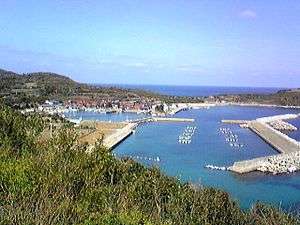 Utsu harbour | |
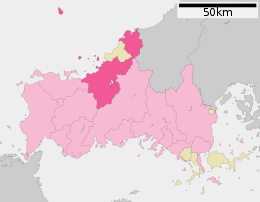 Mishima Island is at the top left of the map. | |
| Geography | |
| Location | Sea of Japan |
| Coordinates | 34.77°N 131.14°E |
| Archipelago | Hagi Archipelago |
| Area | 7.73 km2 (2.98 sq mi) |
| Administration | |
Japan | |
| Yamaguchi Prefecture | |
| Demographics | |
| Population | 829 |
| Ethnic groups | Japanese |
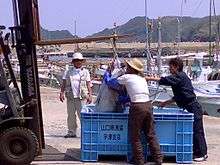
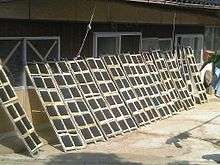
Battle of Tsushima
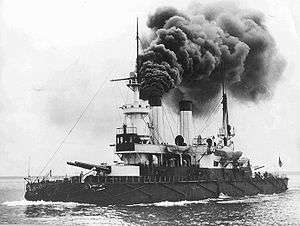
The Battle of Tsushima between Russian and Japanese forces took place near the island of Mishima on 27–28 May 1905, during the Russo-Japanese War. Nikolai Nebogatov surrendered to the Japanese on 28 May, and his remaining ships were taken. One of these, the Admiral Seniavin, was renamed Mishima when commissioned into the Imperial Japanese Navy.[2]:26[3]:14
Cattle
The island is home to the rare and critically-endangered Mishima breed of Japanese native cattle, which was declared a Japanese National Treasure in 1928, and is one of two remaining breeds of Japanese native cattle – the other being the Kuchinoshima breed on Kuchinoshima island in the Tokara Islands.[4][5]:6[6]
Clay
The island is the source of Mishima clay, a dark red basaltic clay high in iron, with low plasticity, which was one of the three types of clay used to make Hagi ware.[7]:164
References
- 見島(みしま) (in Japanese). Yamaguchi Prefecture. Accessed January 2017.
- Rotem Kowner (2009). The A to Z of the Russo-Japanese War. Lanham: Scarecrow Press. ISBN 9780810870079.
- David R. Jones (1981). The military-naval encyclopedia of Russia and the Soviet Union, volume 3. Gulf Breeze, Florida: Academic International Press. ISBN 9780875690414.
- Breed data sheet: Mishima/Japan. Domestic Animal Diversity Information System of the Food and Agriculture Organization of the United Nations. Accessed January 2017.
- [National Institute of Agrobiological Sciences] (2005). Country Report: Japan, annex to The State of the World's Animal Genetic Resources for Food and Agriculture. Rome: Food and Agriculture Organization of the United Nations. ISBN 9789251057629. Accessed January 2017.
- Mishima-Ushi. NODAI Genome Research Center, Tokyo University of Agriculture. Accessed January 2017.
- Richard L Wilson (1995). Inside Japanese Ceramics: A Primer of Materials, Techniques, and Traditions. New York: Weatherhill. ISBN 9780834803466.
![]()